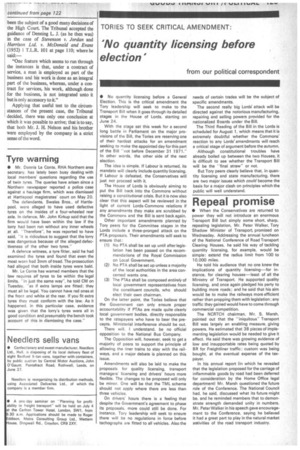TORIES TO SEEK CRITICAL AMENDMENT:
Page 127

If you've noticed an error in this article please click here to report it so we can fix it.
'No quantity licensing before election'
from our political correspondent
• No quantity licensing before a General Election. This is the critical amendment the Tory leadership will seek to make to the Transport Bill when it goes through its detailed stages in the House of Lords, starting on June 24,
With the stage set this week for a second long battle in Parliament on the major provisions of the Bill, the Tories are reserving one of their hardest attacks for an amendment seeking to make the appointed day for this part of the Bill -not before December 31 1971." In other words, the other side of the next election.
The idea is simple. If Labour is returned, its mandate will clearly include quantity licensing. If Labour is defeated, the Conservatives will just not proceed with it.
The House of Lords is obviously aiming to put the Bill back into the Commons without raising a constitutional crisis. But it is now also clear that this aspect will be reviewed in the light of current Lords-Commons relations if any amendments they make are scrubbed by the Commons and the Bill is sent back again.
Other important amendments planned by Tory peers for the Committee stages in the Lords include a three-pronged attack on the PTA proposals. Their amendments will seek to ensure that: (1) No PTA shall be set up until after legislation has been passed on the recommendations of the Royal Commission on Local Government.
(2) No PTA shall be set up unless a majority of the local authorities in the area concerned wants one.
(3) The PTAs shall be composed entirely of local government representatives from the constituent councils, who should elect their own chairman.
On the latter point, the Tories believe that the Government can only ensure proper accountability if PTAs are made quite clearly local government bodies, directly responsible to the ratepayers who have to bear the precepts. Ministerial interference should be out.
There will, I understand, be no official opposition to the National Bus Company.
The Opposition will, however, seek to get a -majority of peers to support the principle of allowing the liner trains to stay with the railways, and a major debate is planned on this issue.
Amendments will also be laid to make the proposals for quality licensing, transport managers' licensing and drivers' hours more flexible. The changes to be proposed will only be minor. One will be that the TML scheme should not apply where there are less than three vehicles.
On drivers' hours there is a feeling that despite the Government's agreement to phase its proposals, more could still be done. For instance. Tory leadership will seek to ensure there will be no regulations in force before tachographs are fitted to all vehicles. Also the needs of certain trades will be the subject of specific amendments.
The second really big Lords' attack will be directed against the notorious manufacturing, repairing and selling powers provided for the nationalized Boards under the Bill.
The Third Reading of the Bill in the Lords is scheduled for August 1, which means that it is extremely doubtful whether the Commons' reaction to any Lords' amendments will reach a critical stage of argument before the autumn.
Although constitutional troubles have already boiled up between the two Houses, it is difficult to see whether the Transport Bill will be the "final straw" or not.
But Tory peers clearly believe that, in quantity licensing and state manufacturing, there are two major issues which could become the basis for a major clash on principles which the public will well understand.








































































































































































































